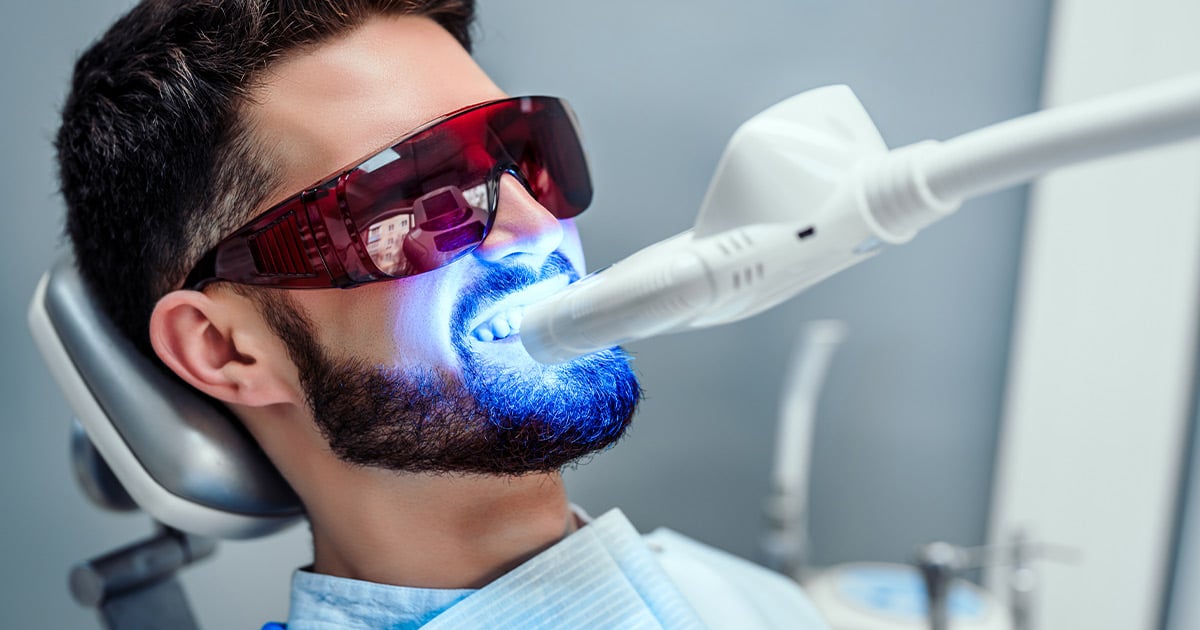Imagine you are preparing for a big presentation at work. You’ve rehearsed, your outfit is sharp, and you feel confident — except when you smile. Lately, you’ve noticed your teeth have looked more yellow than white, making you self-conscious. Is it just part of getting older? Should you drink less coffee? Or is there something you can do about it?
If this scenario sounds familiar, you’re in good company. Many people experience concerns about yellowing teeth and want to know what can be done to regain a brighter smile. What causes teeth to get yellow, and can a dentist whiten teeth?
What Causes Teeth to Yellow?
Teeth naturally become discolored over time for several reasons. While yellowing is often just a cosmetic issue, understanding the causes can help you take steps to prevent it.
- Aging. The outer layer of tooth enamel gets thinner as we age, revealing the dentin beneath.
- Diet. Dark-colored beverages like coffee, tea, soda, and red wine can stain the enamel, causing teeth to darken over time.
- Smoking. Tobacco use is a leading cause of yellow teeth, as nicotine and tar can build up on the enamel.
- Medication. Certain antibiotics, especially those taken in childhood, can cause teeth to become discolored.
- Poor oral hygiene. Infrequent brushing and flossing can lead to a buildup of plaque, which contributes to yellowing.
- Decay. Tooth decay causes discoloration and needs to be treated for cosmetic and health reasons.
- Old fillings. Tooth-colored fillings can discolor over time. In these cases, the specific area of the tooth that was previously filled can be treated.
- Nerve death. When a nerve dies, teeth can become discolored. These teeth may need root canal treatments and possibly crowns to solve the issue.
When to Be Concerned About Yellowing
It is important to remember that minor discoloration is natural and not necessarily a cause for concern. However, if the color of your teeth interferes with your confidence or affects your daily life, it might be time to take action. Here are a few signs it is time to talk to a dentist:
- You avoid smiling in social or professional settings because of the appearance of your teeth.
- Your teeth are noticeably darker than they used to be, even after trying over-the-counter whitening toothpaste or products.
- The discoloration seems sudden or more extreme than you have noticed in other people your age.
In these cases, you may wonder if a dentist can whiten your teeth. The answer is generally yes. Whitening works best on ordinarily healthy teeth and gums, and a dentist has the expertise and resources to whiten teeth safely and effectively.
How Can a Dentist Whiten Teeth?
While over-the-counter whitening products are readily available, professional dental whitening offers more controlled and long-lasting results. Here is why seeing a dentist for whitening may be your best option.
What Does Professional Whitening Involve?
- Assessment and planning. Before starting any treatment, your dentist will evaluate the cause of your yellowing to ensure the whitening process addresses the specific reasons for your discoloration.
- Custom whitening trays. Many dentists offer custom-fitted trays with professional-strength whitening gel. These trays ensure that the whitening agent is applied evenly and stays in place during treatment.
- In-office whitening. For faster results, dentists may offer in-office treatments. They apply a strong whitening gel to your teeth to break down stains effectively in just one session.
- Monitoring. During the whitening process, your dentist will monitor your progress, ensuring that your teeth lighten evenly and you do not experience any sensitivity or other side effects.
How Effective Is It?
Professional whitening treatments are highly effective, often lightening teeth several shades in just one or two appointments. Since a dentist supervises your treatment, you can feel confident they will protect your gums and enamel and minimize the risk of damage.
How to Prevent Further Yellowing After Whitening
After you have achieved a whiter smile, you’ll want to keep it that way. Fortunately, there are several steps you can take to prevent future yellowing and maintain your bright teeth.
- Brush and floss regularly. Make it a habit to brush your teeth at least twice a day and floss daily.
- Limit stain-causing foods and drinks. Cut back on coffee, tea, and red wine, or drink them through a straw to reduce contact with your teeth. Rinse your mouth with water after consuming dark-colored foods and beverages that stain teeth.
- Quit smoking. If you smoke, quitting will benefit your overall health and protect your teeth from further yellowing.
- Visit your dentist regularly. Regular cleanings help remove plaque and prevent stains from forming. Your dentist can also recommend touch-up treatments if needed.
- Touch ups every few years. Sometimes, you may feel like you need a touch up a few years after your initial treatment.
By taking these preventative measures, you can prolong the results of your whitening treatment and enjoy a brighter smile for years.
Ready for a Brighter Smile?
Yellowing teeth can impact your confidence, but you don’t need to live with it. Whether you’ve noticed gradual yellowing over time or are dealing with sudden discoloration, you can achieve noticeable, lasting results with professional whitening treatments.
Yellow teeth shouldn’t hold you back from feeling your best. Your dentist can whiten your teeth again. Make an appointment today with Full Heart Dentistry to explore your options for a whiter, more confident smile.

